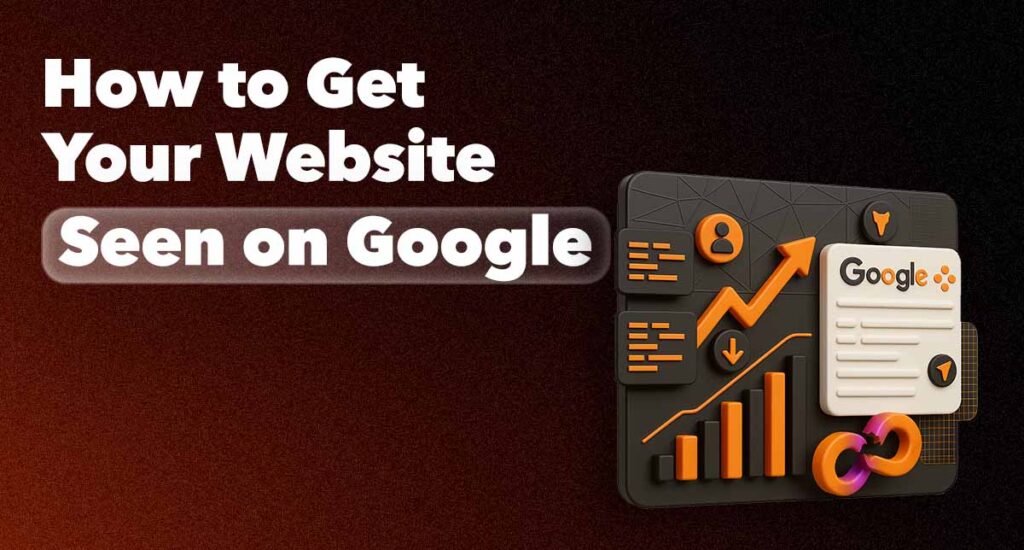In today’s digital world, having a website is just the first step toward growing your business online. The real challenge lies in getting your website noticed by Google, which in turn helps you attract potential customers. After all, Google is the most widely used search engine globally, and most users find businesses through organic search results. If your website isn’t showing up on Google, you’re missing out on an invaluable opportunity to grow your audience and drive traffic. Getting your website seen on Google doesn’t happen overnight, but with the right approach and consistent efforts, you can boost your website’s visibility and climb up the rankings. In this article, we will guide you through the essential steps to help you get your website seen on Google, from understanding how Google indexes websites to the SEO practices that will make a significant difference.
How Google Finds and Indexes Websites
Before diving into the “how” of getting your website seen on Google, it’s important to understand how Google works behind the scenes. When you create a website, it doesn’t automatically appear in Google’s search results. Instead, Google uses a process called “crawling” to find and analyze the pages on your site, followed by “indexing,” which is the process of storing and organizing your pages for future searches.
Google uses web crawlers (bots) to scan websites on the internet. These crawlers visit every page on your site and follow the links between them. Once a page is crawled, Google indexes it, meaning it stores the content and makes it available for people to find when they search for relevant keywords. The indexing process also involves determining the relevance of your content based on its quality and adherence to Google’s ranking criteria. This is where SEO comes into play, as optimizing your website for search engines increases the chances of getting indexed and ranking higher in search results.
The SEO Basics You Must Follow to Get Seen on Google
Search Engine Optimization (SEO) is one of the most critical factors in getting your website seen on Google. SEO refers to the strategies and techniques used to optimize your website so that Google’s crawlers can easily find, index, and rank your pages. Here are the key elements of SEO that you must follow to increase your website’s visibility:
Pro Tip: If you need expert help in implementing a comprehensive SEO strategy, check out our SEO services.
Your Content Matters: What Google Wants to Show
Content is at the core of what Google wants to show its users. Google prioritizes high-quality, relevant, and informative content that answers users’ questions and meets their needs. Your content must be valuable to the audience you’re targeting, and it should be structured in a way that’s easy for Google to understand.
Here’s How to Fix It:
- Use Relevant Keywords: Conduct keyword research to identify what your target audience is searching for. Use these keywords naturally throughout your content, especially in headings, subheadings, and meta descriptions.
- Create High-Quality Content: Focus on providing detailed, helpful, and engaging content that answers your audience’s questions or solves their problems.
- Structure Your Content: Use headings (H1, H2, etc.), bullet points, and short paragraphs to make your content easy to read and scan.
By creating content that is both valuable and optimized for search engines, you’ll increase the chances of your website ranking higher on Google.
Is Your Website Mobile-Friendly and Fast Enough?
Google places a significant emphasis on mobile-friendliness and site speed as ranking factors. With the rise of mobile internet use, it’s no longer enough to have a desktop version of your site that works well. In recent years, Google has adopted mobile-first indexing, meaning that it primarily uses the mobile version of your website to evaluate its content for ranking purposes. In other words, your mobile site is now more important than your desktop version when it comes to SEO.
If your website isn’t optimized for mobile or isn’t loading quickly, it can seriously harm your chances of ranking well on Google. It’s crucial to understand why Google values these factors and how you can improve them to ensure that your website is seen by the right audience.
Why It Matters: Mobile-Friendly Websites
Mobile traffic now accounts for the majority of internet browsing. With more and more people using their phones to search for information, make purchases, and browse websites, it’s no surprise that Google now prioritizes mobile-first indexing. This means that Google evaluates your mobile site’s design, functionality, and user experience to determine your rankings.
What this means for you:
If your website doesn’t look or work well on mobile devices, it could lead to a decrease in both traffic and rankings. A poor mobile experience could cause users to abandon your site quickly, leading to high bounce rates. A high bounce rate is a clear signal to Google that your website isn’t providing a positive user experience, which can lower your ranking.
Moreover, if your website is not mobile-optimized, users might find it difficult to navigate, making it less likely they will stay on your page or convert into customers. This directly impacts your website’s effectiveness, and Google’s algorithm takes this into account when determining which sites to rank higher.
Website Speed:
Another critical factor is how fast your website loads. Speed is one of the most significant ranking factors on Google. If your website takes too long to load, users will leave before they even have a chance to interact with your content. According to studies, websites that load in over 3 seconds lose over 50% of visitors, which is a substantial loss of potential traffic. This not only affects user engagement but also results in a high bounce rate, which signals to Google that your site is not providing a positive experience.
Why website speed matters:
- User Retention: Slow websites frustrate users and encourage them to abandon the site before they can explore your products or services. This drastically reduces the chances of converting visitors into customers.
- SEO Impact: Slow websites are penalized by Google, leading to lower rankings. Google aims to provide users with the best possible experience, and a fast-loading website is crucial for this.
- Mobile Optimization: A slow-loading website is even worse on mobile devices, where users expect quick responses. Google’s mobile-first indexing means that poor performance on mobile will hurt your rankings more than ever.
Here’s How to Fix It:
- Ensure Mobile Optimization:
Mobile optimization is not just about having a responsive design; it’s about making sure your website works seamlessly across all mobile devices, screen sizes, and operating systems. A responsive design automatically adjusts to fit different screen sizes, ensuring that your content is easy to read and navigate. Here are some tips for ensuring mobile optimization:
- Responsive Web Design: Make sure your website adjusts fluidly to different screen sizes, whether users are on smartphones, tablets, or desktops.
- Mobile Navigation: Simplify navigation on mobile devices by minimizing the number of steps required to find information. Implement a user-friendly menu and optimize clickable buttons.
- Touch-Friendly Elements: Ensure that buttons, links, and other interactive elements are large enough for users to tap easily on touchscreens. Small buttons that are difficult to click can frustrate mobile users.
- Improve Load Speed:
Website speed is directly related to user experience and SEO performance. If your site is slow to load, you risk losing visitors and ranking lower on Google. Here’s how you can speed up your website:
- Compress Images: Large image files can significantly slow down your website. Compress images before uploading them to reduce file sizes while maintaining quality.
- Minimize HTTP Requests: Reduce the number of elements (such as images, scripts, and stylesheets) on your pages to minimize the time it takes to load the page.
- Enable Browser Caching: Caching allows frequently accessed resources to be stored in the user’s browser, reducing load time for future visits.
- Use Content Delivery Networks (CDNs): CDNs distribute your content across multiple servers located in different geographic regions, helping reduce load times for users regardless of their location.
- Optimize Code: Minimize CSS, JavaScript, and HTML files by removing unnecessary characters, comments, and spaces. This reduces the size of the files and makes them faster to load.
- Test and Monitor Your Site’s Performance:
After implementing these changes, it’s essential to continuously monitor your website’s performance. Use tools like Google PageSpeed Insights, GTmetrix, and Lighthouse to test your site’s load time and mobile performance. These tools offer detailed reports on areas that need improvement, allowing you to fine-tune your website for optimal speed and mobile-friendliness.
Backlinks and Authority: Why They Help You Get Seen on Google
Mobile optimization is not just about having a responsive design; it’s about making sure your website works seamlessly across all mobile devices, screen sizes, and operating systems. A responsive design automatically adjusts to fit different screen sizes, ensuring that your content is easy to read and navigate. Here are some tips for ensuring mobile optimization:
Website speed is directly related to user experience and SEO performance. If your site is slow to load, you risk losing visitors and ranking lower on Google. Here’s how you can speed up your website:
After implementing these changes, it’s essential to continuously monitor your website’s performance. Use tools like Google PageSpeed Insights, GTmetrix, and Lighthouse to test your site’s load time and mobile performance. These tools offer detailed reports on areas that need improvement, allowing you to fine-tune your website for optimal speed and mobile-friendliness.
Backlinks are links from other websites that point to your pages. Google sees these links as votes of confidence, signaling that other reputable websites trust and value your content. Websites with more quality backlinks tend to rank higher in search results.
Why Backlinks Matter:
- Trustworthiness: Backlinks from authoritative and relevant websites increase your website’s trustworthiness in the eyes of Google.
- Better Ranking Potential: The more high-quality backlinks you acquire, the more likely your site is to rank higher for relevant search queries.
Here’s How to Fix It:
- Build Relationships with Influencers: Reach out to influencers, bloggers, and businesses in your industry to collaborate on content that includes backlinks.
- Guest Blogging: Write guest posts on reputable sites to get backlinks to your own website.
- Create Link-Worthy Content: Produce valuable, shareable content that naturally attracts backlinks, such as case studies, research, or infographics.
Building a solid backlink profile is a long-term strategy that will help you improve your site’s authority and visibility on Google.
How Long Does It Take to Get Seen on Google?
One of the most common questions is how long it takes for a website to show up in search results. The truth is, there’s no exact timeline. However, there are several factors that can affect how quickly your website gets indexed and ranked by Google.
Factors That Affect Timing:
- Website Age and Authority: New websites typically take longer to get noticed by Google, while older, authoritative websites may rank faster.
- Quality of Content: High-quality content that is well-optimized can speed up the ranking process.
- SEO Efforts: Websites with strong, ongoing SEO efforts may see faster improvements in rankings.
Typically, it can take anywhere from a few weeks to several months for your website to appear in Google’s search results, depending on the competitiveness of your keywords and your site’s overall SEO health. If you’re looking to speed up the process, Google Ads can be a helpful tool. While Google Ads won’t directly improve your organic rankings, it can drive immediate traffic to your site, allowing you to gain visibility while you work on your SEO.
You Focus on Your Business; We’ll Handle Google
Getting your website seen on Google requires ongoing effort and expertise. You might not have the time or resources to constantly update your website, improve your SEO, or create high-quality content. This is where we come in. At HDM Agency, we specialize in helping businesses like yours boost their visibility on Google through tailored SEO strategies, content creation, and digital marketing. Let us handle the technical aspects while you focus on growing your business. We’ll make sure your website gets seen by the right people at the right time.
Conclusion
Getting your website seen on Google is essential for driving traffic and growing your business. By following the right SEO practices, ensuring your site is mobile-friendly, improving your content, and building backlinks, you’ll increase your chances of ranking higher and reaching a wider audience. It’s a process that requires ongoing effort, but with the right strategy, your website will get the attention it deserves. If you need help along the way, HDM Agency is here to guide you in achieving your digital marketing goals.
FAQ
- How long does it take for my website to rank on Google?
It generally takes 3 to 6 months for new websites to start ranking well on Google. However, this timeline can vary depending on your niche, competition, and SEO efforts.
- Can paid ads help me get seen on Google?
Yes! Google Ads can give your website immediate visibility and drive traffic to your site, but it’s important to continue working on your SEO for long-term results.
- How do I know if my website is mobile-friendly?
You can use Google’s Mobile-Friendly Test tool to check if your website is optimized for mobile devices. If it’s not, it’s essential to implement a responsive design to improve both user experience and SEO.
- How do I get more backlinks for my website?
Building backlinks can take time. Focus on creating high-quality, shareable content and building relationships with other businesses or bloggers in your industry. Guest blogging, partnerships, and influencer outreach can all help you gain more backlinks.
It generally takes 3 to 6 months for new websites to start ranking well on Google. However, this timeline can vary depending on your niche, competition, and SEO efforts.
Yes! Google Ads can give your website immediate visibility and drive traffic to your site, but it’s important to continue working on your SEO for long-term results.
You can use Google’s Mobile-Friendly Test tool to check if your website is optimized for mobile devices. If it’s not, it’s essential to implement a responsive design to improve both user experience and SEO.
Building backlinks can take time. Focus on creating high-quality, shareable content and building relationships with other businesses or bloggers in your industry. Guest blogging, partnerships, and influencer outreach can all help you gain more backlinks.









